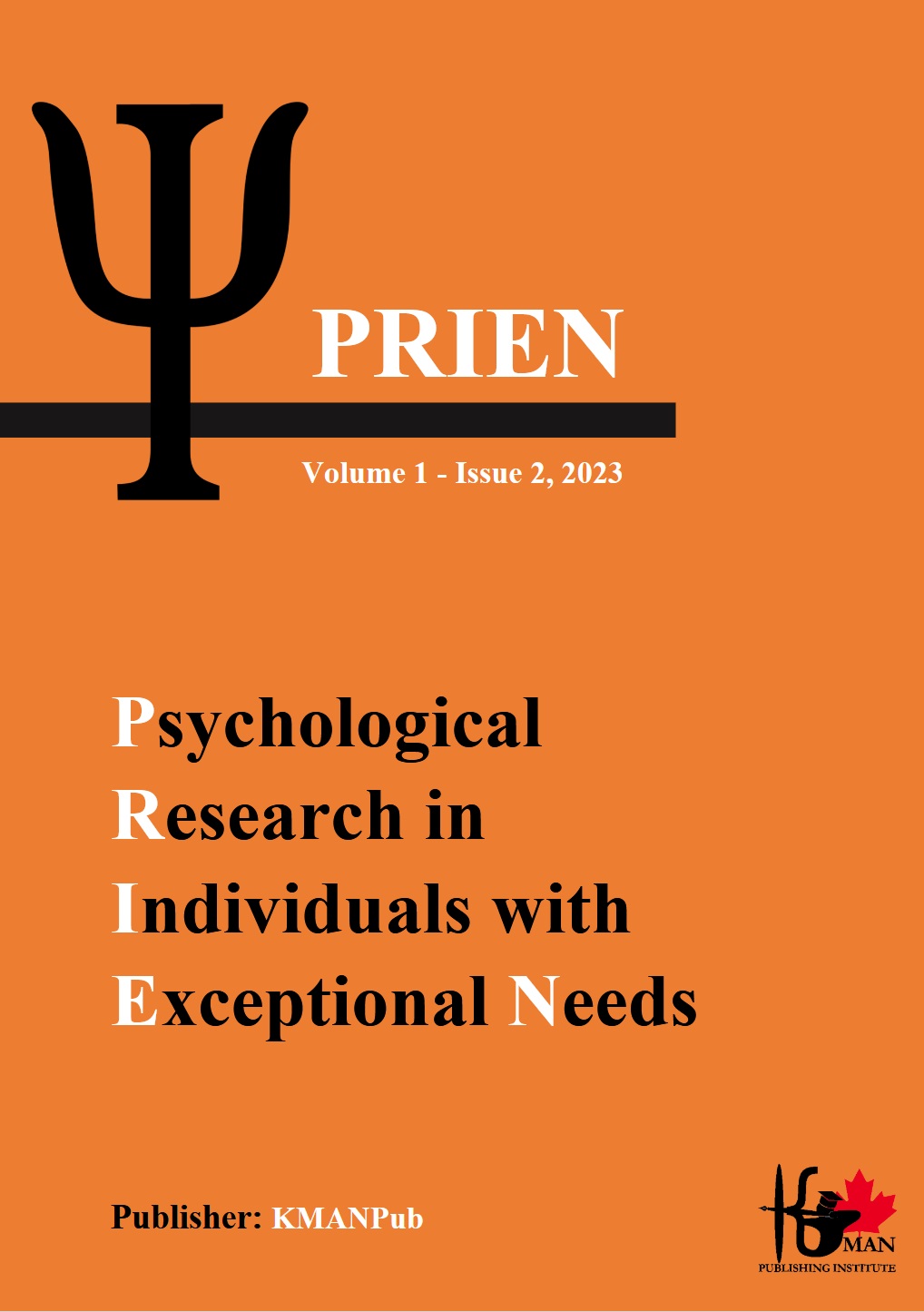The Role of Social Support and Emotion Regulation in Fostering Curiosity Among Individuals with Specific Learning Disorders
Keywords:
Curiosity, Social Support, Emotion Regulation, Specific Learning Disorders, Pearson Correlation, Linear Regression, Psychological Well-beingAbstract
This study aimed to investigate the relationships between curiosity, social support, and emotion regulation in individuals with specific learning disorders (SLD). The objective was to determine how social support and emotion regulation predict levels of curiosity in this population, providing insights for effective interventions. The study employed a cross-sectional design with a sample size of 252 participants, selected based on the Morgan and Krejcie table. Data were collected using the Curiosity and Exploration Inventory-II (CEI-II) for curiosity, the Multidimensional Scale of Perceived Social Support (MSPSS) for social support, and the Difficulties in Emotion Regulation Scale (DERS) for emotion regulation. Pearson correlation and linear regression analyses were conducted using SPSS-27 to examine the relationships between the variables. Descriptive statistics indicated moderate levels of curiosity, social support, and emotion regulation among participants. Pearson correlation analysis revealed significant positive correlations between curiosity and both social support (r = 0.52, p < 0.001) and emotion regulation (r = 0.46, p < 0.001). Regression analysis showed that social support and emotion regulation collectively accounted for 37% of the variance in curiosity (R² = 0.37, F(2, 249) = 72.19, p < 0.001). Both social support (B = 0.32, p < 0.001) and emotion regulation (B = 0.25, p < 0.001) emerged as significant predictors of curiosity. The findings highlight the significant roles of social support and emotion regulation in fostering curiosity among individuals with SLD. Supportive social environments and effective emotion regulation strategies are critical for promoting curiosity and engagement. These insights can inform the development of targeted interventions aimed at enhancing the well-being and academic success of individuals with SLD.
Downloads
References
Aghaziarati, A., Fard, F. R., Rahimi, H., & Parsakia, K. (2023). Investigating the Effect of Electrical Stimulation (tDCS) of the Prefrontal Cortex of the Brain on the Improvement of Behavioral and Neurological Symptoms of Children with Specific Learning Disabilities. Health Nexus, 1(2), 44-50.https://doi.org/10.61838/kman.hn.1.2.6
Azpiazu, L., Fernández, A. R., & Palacios, E. G. (2021). Adolescent Life Satisfaction Explained by Social Support, Emotion Regulation, and Resilience. Frontiers in psychology, 12.https://doi.org/10.3389/fpsyg.2021.694183
Balverdi, F., & Babakhani, N. (2020). Pattern of Creativity Explanation based-on Executive Functions of the Brain by Mediating Cognitive-Emotional Regulation among High School Students in Tehran. Journal of Community Health, 7(2), 136-145.https://www.magiran.com/paper/2112464
Basharpoor, S., & Ahmadi, S. (2020). Predicting the tendency towards high-risk behaviors based on moral disengagement with the mediating role of difficulties in emotion regulation: A Structural Equation Modeling. Journal of Research in Psychopathology, 1(1), 32-39.https://doi.org/10.22098/jrp.2020.1030
Behroozi, N., Mohammadi, F., & Omidian, M. (2018). Social Support, Metacognitive Beliefs, Mental Health and Vitality of Normal and Delinquent Adolescent Boys in Correction and Rehabilitation Centers of Ahvaz. Strategic Research on Social Problems, 7(1), 81-96.https://doi.org/10.22108/ssoss.2018.103836.1072
Bulut, S., Bukhori, B., & Parsakia, K. (2024). Enhancing Selective Attention in Children with Learning Disorders: Efficacy of Executive Functions Training. KMAN Counseling & Psychology Nexus, 1(2), 86-93.https://doi.org/10.61838/kman.psychnexus.1.2.14
Buursma, M. P., Tintle, N. L., Boven, E., DeVon, H. A., & Dunn, S. L. (2020). Lack of perceived social support in patients with ischemic heart disease is associated with hopelessness. Archives of Psychiatric Nursing, 34(2), 14-16.https://doi.org/10.1016/j.apnu.2019.12.001
Dragan, M. (2015). Difficulties in emotion regulation and problem drinking in young women: The mediating effect of metacognitions about alcohol use. Addictive behaviors, 48, 30-35.https://doi.org/10.1016/j.addbeh.2015.04.008
Ebrahimi, S., & Esmaeili, M. (2023). The Effectiveness of Character Strengths-based Intervention on the Psychological Well-being and Resilience among Adolescents. Educational and Scholastic studies, 11(4), 439-417.https://pma.cfu.ac.ir/article_2722_a3c35bd44e634af94b2808d529b61087.pdf
Enayati Shabkolai, M., Enayati Shabkalai, M., & Bagheri Dadokolai, M. (2023). The Effectiveness of Treatment based on Acceptance and Commitment on Social Adaptation, Academic Self-Regulation and Cognitive Flexibility of Students with Specific Learning Disorders. International Journal of Education and Cognitive Sciences, 4(1), 33-41.https://doi.org/10.61838/kman.ijecs.4.1.5
Fariba, M., Simin, H., Seyedeh Monavar, Y., & Mozhgan, M. (2022). The Mediating Role of Anger in Relationship with Perceived Social Support and Cyber Bullying-Victimization Girl Adolescents. The Women and Families CulturalEducational Journal, 17(60), 131-153.https://www.magiran.com/paper/2499407
Ghazvineh, J., Jadidi, H., Taghvaeinia, A., & Morovvati, Z. (2022). The effect of Emotional Intelligence, Self-Regulation and Assertiveness on Academic Satisfaction with mediation of Perceived Social Support in students of the second high school. Journal of Research in Educational Systems, 16(59), 49-62.https://www.jiera.ir/article_16944_en.html
Gruber, M. J., & Ranganath, C. (2019). How Curiosity Enhances Hippocampus-Dependent Memory: The Prediction, Appraisal, Curiosity, and Exploration (PACE) Framework. Trends in Cognitive Sciences, 23(12), 1014-1025.https://doi.org/10.1016/j.tics.2019.10.003
Heiman, T., & Olenik-Shemesh, D. (2022). Cyber-Victimization Experience among Higher Education Students: Effects of Social Support, Loneliness, and Self-Efficacy. International journal of environmental research and public health, 19(12).
Heshmati, A., Saed, O., Mohammadi, J., Zenoozian, S., & Yousefi, F. (2018). The efficacy of group acceptance and commitment therapy on reducingacademic procrastination and improving difficulty in emotion regulation: Arandomized clinical trial [Original Research]. Scientific Journal of Kurdistan University of Medical Sciences, 23(5), 65-77.https://doi.org/10.52547/sjku.23.5.65
Huang, L. (2023). A Study on the Relationship Between Socialization of Blended Learning and Motivation Regulation Under Sustainable Development With Teacher Support as the Moderating Variable. Sage Open, 13(4).https://doi.org/10.1177/21582440231201374
Hunaepi, H., Ikhsan, M., Suwono, H., & Sulisetijono, S. (2021). Curiosity in Learning Biology: Literature Review. Prisma Sains Jurnal Pengkajian Ilmu Dan Pembelajaran Matematika Dan Ipa Ikip Mataram, 9(2), 343.https://doi.org/10.33394/jps.v9i2.4272
Iri, H., Makvandi, B., Bakhtiarpour, S., & Hafezi, F. (2019). Comparison of the effectiveness of Acceptance and Commitment Therapy and Dialectical Behavioral Therapy on health anxiety, psychosocial adjustment and cognitive emotion regulation of divorced women. medical journal of mashhad university of medical sciences, 61(supplment1), 79-88.https://doi.org/10.22038/mjms.2019.13786
Jabarooti, N., & Bagherimajd, R. (2023). Canonical analysis of lifelong learning on teachers' professional development. Journal of Educational Sciences, 30(1), 127-144.https://doi.org/10.22055/edus.2022.42154.3399
Joormann, J., & Gotlib, I. H. (2010). Emotion Regulation in Depression: Relation to Cognitive Inhibition. Cognition & Emotion, 24(2), 281-298.https://doi.org/10.1080/02699930903407948
Karimi Dastaki, A., & Mahmudi, M. (2024). The Effectiveness of Life Meaning Workshops on Resilience, Negative Affect, and Perceived Social Support in Students. Journal of Psychological Dynamics in Mood Disorders (PDMD), 3(1), 187-197.https://doi.org/10.22034/pdmd.2024.448984.1063
Lievore, R. (2024). Let’s Face It! The Role of Social Anxiety and Executive Functions in Recognizing Others’ Emotions From Faces: Evidence From Autism and Specific Learning Disorders. Development and Psychopathology, 1-13.https://doi.org/10.1017/s0954579424000038
Salmon, A. K., & Barrera, M. X. (2021). Intentional questioning to promote thinking and learning. Thinking Skills and Creativity, 40, 100822.https://www.sciencedirect.com/science/article/pii/S1871187121000377
Schertz, H. H., Odom, S. L., Baggett, K. M., & Sideris, J. H. (2013). Effects of Joint Attention Mediated Learning for toddlers with autism spectrum disorders: An initial randomized controlled study. Early Childhood Research Quarterly, 28(2), 249-258.https://doi.org/https://doi.org/10.1016/j.ecresq.2012.06.006
Schultheis, A. M., Mayes, Linda C, Rutherford, Helena J. V. (2019). Associations between Emotion Regulation and Parental Reflective Functioning. Journal of Child and Family Studies, 28(4), 1094-1104.https://doi.org/10.1007/s10826-018-01326-z
Southward, M. W., Eberle, J. W., & Neacsiu, A. D. (2020). Multilevel Associations of Daily Skill Use and Effectiveness With Anxiety, Depression, and Stress in a Transdiagnostic Sample Undergoing Dialectical Behavior Therapy Skills Training.https://doi.org/10.31234/osf.io/569ey
Wade, S., & Kidd, C. (2019). The Role of Prior Knowledge and Curiosity in Learning. Psychonomic Bulletin & Review, 26(4), 1377-1387.https://doi.org/10.3758/s13423-019-01598-6
Willem, C., Gandolphe, M.-C., Roussel, M., Verkindt, H., Pattou, F., & Nandrino, J.-L. (2019). Difficulties in emotion regulation and deficits in interoceptive awareness in moderate and severe obesity. Eating and Weight Disorders - Studies on Anorexia, Bulimia and Obesity, 24(4), 633-644.https://doi.org/10.1007/s40519-019-00738-0
Yıldırım, D., & Akman, Ö. (2023). Perceived Social Support and Psychological Well-Being in Patients With Chronic Diseases. Balıkesır Health Sciences Journal.https://doi.org/10.53424/balikesirsbd.1202679
Yuan, W., Xie, Z., Dong, P., & Yang, Y. (2023). Linking perceived social support to self-esteem and social integration among adolescents with visual impairment: A cross-lagged study [Original Research]. Frontiers in psychology, 13.https://doi.org/10.3389/fpsyg.2022.1054857
Zamanpour, Z., Pakdaman, S., Ghanbari, S., & Nejat, P. (2023). The Moderating Role of Mother's Reflective Functioning in the Relationship Between Child's Temperament and Quality of Mother-Child Relationship. Journal of Family Research, 19(3), 519-531.https://doi.org/10.48308/jfr.19.3.519
Zhang, L., Xie, Z., & Jian, L. (2023). How Does Mathematical Modeling Competency Affect the Creativity of Middle School Students? The Roles of Curiosity and Guided Inquiry Teaching. Frontiers in psychology, 13.https://doi.org/10.3389/fpsyg.2022.1044580
Downloads
Additional Files
Published
Issue
Section
License

This work is licensed under a Creative Commons Attribution-NonCommercial 4.0 International License.
















